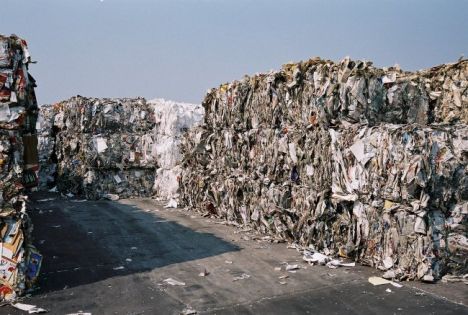In time for the holiday season, while you're perusing best-of-lists to find that perfect book gift for a loved one, here's something the publishing industry doesn't want you to know. By shipping books to retailers on consignment terms, then requiring the return or destruction of unsold merchandise, the publishing industry operates unlike all other manufacturers. An estimated 30 TO 40 PERCENT of books are returned by bookstores annually. Between 65 and 95 percent of returned books are pulped - destroyed by publishers.

Clearly, the publishing indutry overprints on a massive scale because of returns. And the environmental impact of this pulping waste is staggering. The Canadian website Book Industry Bailout has calculated the shocking scale of trees cut and greenhouse gas emissions due to overprinting by the publishing industry in Canada. In the U.S., the environmental destruction is multiplied at least tenfold, since our publishing industry is 15 to 20 times larger.

Most big publishers would like to keep this a secret, refusing to release hard figures on their returns. Conscientious small publishers are thankfully not so quiet on the subject, especially those who have moved to publish-on-demand business models.
Reporting in the Wall Street Journal in 2005, Jeffrey Trachtenberg called returns "the dark side of the book world," and quoted Barnes & Noble CEO Steve Riggio as saying, "We'd like to see (returns) discontinued. Any rational business person looking at this practice would think the industry has gone mad." Last year, Borders executive VP Robert P. Gruen told the New York Times that "We generally support the idea of looking at potential solutions to a return system that is not working well for the industry as a whole."

According to Book Industry Bailout, the practice of publishers providing books to retailers on returnable terms only dates to the 1930s, and "began as a temporary sales gimmick by a desperate New York publisher." But the concept spread as booksellers demanded the same favorable terms from other publishers, and eventually became standard – "handicapping an entire industry for the next seven decades in an unfortunate practice that has wasted literally billions of dollars worldwide."
Nearly all non-book retailers purchase products from manufacturers or distributors at 50% or less of their retail value, mark them up, then discount the items until they sell. They can't return unsold items.

The business of selling books turns this normal practice on its head by allowing book returns of unsold books to publishers. Yet it costs money to ship returned books back. Thus was born the practice of stripping covers from books, only sending back the covers, and book stores themselves destroying the remainder of the unsold books.

Dumpstered books behind a B. Dalton Bookseller store in Ohio, 2003
Independent book stores have far fewer returns than chains, with sell-through rates estimated at 80 percent. This suggests that smarter buying practices by stores reduce returns, and further demonstrates why overprinting is so unnecessary.
Many chain book stores do the publishers' dirty work of pulping the books for them – booksellers call it dumpstering. And when financially struggling book chains shut stores, as is happening right now with Borders closing 200 Waldenbooks locations, there is enormous pressure for management to take the cheapest way out and order employees to simply dumpster unsold books.
(By ERIK OSE)

No comments:
Post a Comment